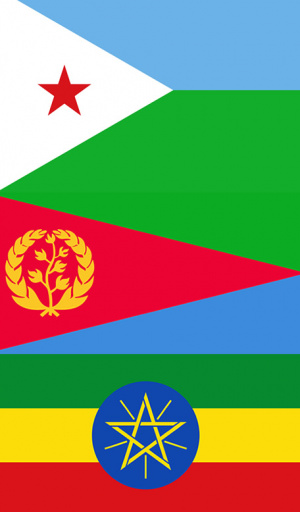Language/Afar/Vocabulary/How-to-Say-Hello-and-Greetings
 Հայերէն
Հայերէն Български език
Български език 官话
官话 官話
官話 Hrvatski jezik
Hrvatski jezik Český jazyk
Český jazyk Nederlands
Nederlands English
English Suomen kieli
Suomen kieli Français
Français Deutsch
Deutsch עברית
עברית हिन्दी
हिन्दी Magyar
Magyar Bahasa Indonesia
Bahasa Indonesia فارسی
فارسی Italiano
Italiano 日本語
日本語 Қазақ тілі
Қазақ тілі 한국어
한국어 Νέα Ελληνικά
Νέα Ελληνικά Şimali Azərbaycanlılar
Şimali Azərbaycanlılar Język polski
Język polski Português
Português Limba Română
Limba Română Русский язык
Русский язык Српски
Српски Español
Español العربية القياسية
العربية القياسية Svenska
Svenska Wikang Tagalog
Wikang Tagalog தமிழ்
தமிழ் ภาษาไทย
ภาษาไทย Türkçe
Türkçe Українська мова
Українська мова Urdu
Urdu Tiếng Việt
Tiếng Việt"Assalaamu qaleykum" Afar learners!😀
Do you want to learn how to say "Hello" in the Afar language?
Welcome to the lesson on Afar greetings for everyday life! Afar is a Cushitic language spoken by the Afar people in the Horn of Africa. It is a fascinating language with a rich history and culture, and learning the greetings is a great way to get started with learning Afar.
In this lesson, you will learn some of the most common Afar greetings that are used in everyday life. You will also learn about the cultural significance of greetings in Afar culture and how they reflect the customs and values of the Afar people.
Whether you are traveling to Afar or just want to learn more about this fascinating language and culture, this lesson will provide you with a solid foundation in Afar greetings.
If you are planning a trip to Djibouti, Eritrea or Ethiopia and you are trying to learn the Afar language, keep reading to discover some of the most important greetings.
Let’s get started!
Facts about the Afar Language[edit | edit source]
- The Afar language (also known as "Qafár af", "'Afar Af", "Adal", "Afraf", "ዓፋር" or "عفر") is spoken by the inhabitants of Djibouti, Eritrea and Ethiopia.
- There were around 505,000 speakers in the Northern Red Sea and Southern Red Sea regions of eastern Eritrea in 2020 and around 196,000 speakers in Djibouti in 2018.
Greetings[edit | edit source]
| Translation | Afar | Audio |
|---|---|---|
| General greeting | Assalaamu qaleykum | |
| Reply to Assalaamu qaleykum | Waqalaeykumu salaam | |
| General greeting | Nagayna sin amol tanay | |
| Reply to Nagayna sin amol tanay | Nagayna sin amol kaadu tamay | |
| Morning greeting spoken to one person | Maacisse? |
|
| Reply to Maacisse | Meqe maaca gey | |
| Morning greeting spoken to a group of people | Maacisseni? | |
| Reply to Maacisseni | Meqe maaca geya | |
| Evening greeting spoken to one person | Nagay asse? | |
| Reply to Nagay asse | Meqe assima gey | |
| Evening greeting spoken to one person | Naga'sse? |
|
| Reply to Naga'sse | Meq'assima | |
| Evening greeting spoken to a group of people | Nagay asseni? | |
| Reply to Nagay asseni | Meqe assima geya | |
| How are you? spoken to one person | Nagay tanito? | |
| How are you? spoken to one person | Nagay tanto? | |
| Reply to Nagay tanito and Nagay tanto | Nagay an | |
| How are you? spoken to a group of people | Nagay tanitooni? | |
| How are you? spoken to a group of people | Nagay taniini? | |
| Reply to Nagay tanitooni and Nagay taniini | Nagay nanno | |
| How are you? | Miqto? | |
| Good night | Mequ Bara |
|
| Where do you live? | Guub |
|
| Thank you | Gadda ge | |
| good morning/afternoon | maacisse | |
| good evening | nagasse | |
| good night | meqe bara | |
| goodbye | salaamata [AR],
muquk raaqá |
|
| I love you | Koo kiciyyoh | |
| How are you? | Mannay hay ? | |
| yes | yey, marcaba | |
| Eh! | Alé ! | |
| help | ħáraa |
Hospitality in the Afar People Culture[edit | edit source]
In Afar culture, welcoming strangers is considered a sign of respect and hospitality. The Afar people are known for their warm and friendly nature, and they place great importance on being welcoming to those who visit their communities.
When welcoming a stranger in Afar culture, a common greeting is "Asalam Alikum," which translates to "peace be upon you." This greeting is often accompanied by a smile and a handshake, and is used to express goodwill and a desire for peace.
Another important aspect of welcoming strangers in Afar culture is offering food and drink. This is seen as a way of showing hospitality and generosity, and is considered a critical part of Afar cultural traditions.
In Afar society, visitors are treated with respect and kindness, and it is customary for the host to go out of their way to make them feel at home. This strong cultural tradition of hospitality is just one of the many reasons why Afar communities are known for their warm and welcoming atmosphere.
Videos[edit | edit source]
Sample video in Afar
Sources[edit | edit source]
- https://quizlet.com/89504351/afar-language-basics-flash-cards/
- http://users.elite.net/runner/jennifers/
- https://www.youtube.com/watch?v=CPzta_n-wag
- https://omniglot.com/writing/afar.htm
Other Lessons[edit | edit source]


